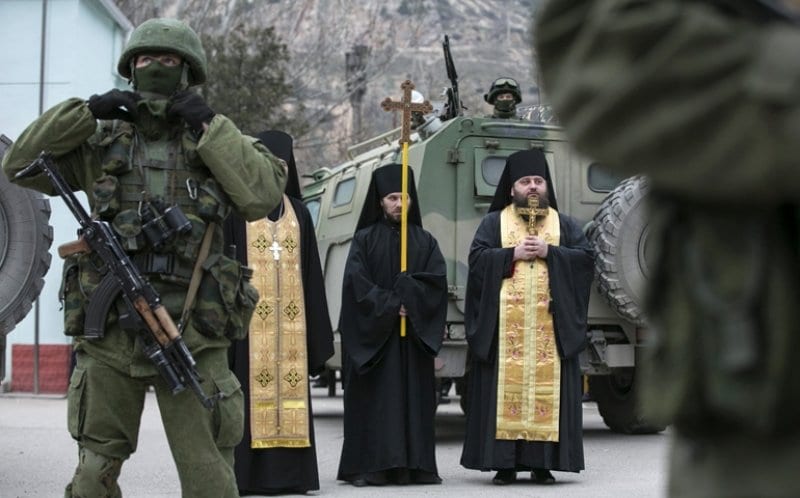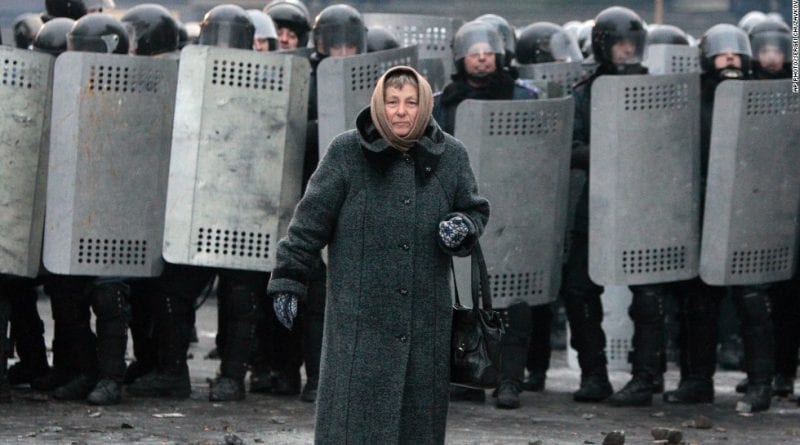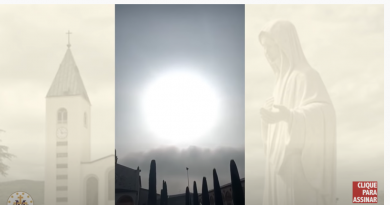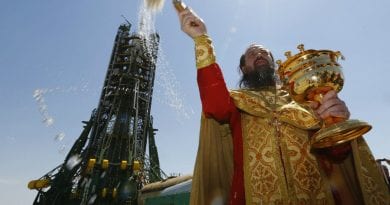The Schism: Ukraine, Catholics, and the Russia Orthodox Church… Conflict Could Set the whole World on Fire… “Violence will be envitable”… Tensions could explode into war that involve Europe, USA and Russia”
Russia dealt firmly with Ukraine’s latest provocation amid an explosive situation in the region. Although there are some divisions among Western nations on Russia policy, Washington hardliners dominate US and NATO strategy.
Explaining the situation to world leaders at the G20 summit, Russian President Vladimir Putin said the recent naval incident in the Kerch Strait was a result of three Ukrainian ships taking illegal and provocative action.

Ukraine ignored the notification and other requirements of the longstanding 2003 navigation agreement with Russia which has functioned well until now. Violation of the agreement triggered a firm response from the Russian side resulting in the capture of the offending ships and crew members.
Context is important. The United States and its Western allies fomented the 2014 anti-Russian coup in Ukraine. The US side openly boasted that it had spent several billion dollars in previous years to prepare for the regime change.
More broadly, the regime change in Ukraine is linked to the continuing Western strategy of “containment” of the Eurasian landmass. On the west of the landmass, the objective is the containment of Russia while on the east it is the containment of Russia and China.

Such is the geopolitical strategy led by Washington. Disruption of China’s Belt and Road initiative and Russia’s Eurasian Economic Union are part and parcel of the plan.
The Kerch Strait provocation is a dangerous escalation of regional tensions. If not properly managed, these tensions could explode into a war that would involve Europe and the United States.
The mainstream press in the West misleads its readers on the situation by supporting Washington’s anti-Russia narrative parroted by NATO and Europeans.
It is not only the Kerch Strait standoff that is raising tensions. Ukraine just imposed martial law in its eastern provinces bordering Russia. In this region, people who speak Russian and Orthodox Christianity predominate.
Ukraine is a modern day term for a portion of Slavic ethnic territories bordering today’s Russia. The western zone is Roman Catholic and the eastern areas bordering Russia are Orthodox.
Thus, there are significant religious as well as ethnic identity issues. In the 19th and early 20th centuries, Vienna assisted by Berlin, pushed a policy in this region to challenge Moscow by exploiting the division between Roman Catholics and Orthodox Christians.
Today, a similar situation is playing out but a split in the Orthodox Church in Ukraine has occurred. For a number of centuries, this church was organized under the authority of the Russian Orthodox patriarch. But in recent years a small breakaway group in Ukraine has sought to create an independent church.
In recent months, Ukraine has seen a major crisis over spiritual authority and disposing of Orthodox Church property in Ukraine. The Russian speaking Orthodox Christians in eastern Ukraine now under martial law face confiscation of their church properties by breakaway church authorities in Kiev.
Violence will be inevitable as those in the east seeking to maintain their affiliation with the Russian Orthodox Church, and to retain their churches, confront any regime-backed breakaway church attempts to seize them.
Western media is not reporting this side of the story in Ukraine. For its part, Moscow has downplayed it saying that the Kerch provocation and the imposition of martial law in the east are driven by Ukrainian President Petro Poroshenko’s bid for re-election.
But the situation is more explosive than is apparent. Western intrigues against Russia using religion as part of psychological and political aggression can lead to further instability in Ukraine and even result in war.
The international community must have a clear picture of the situation in Ukraine and must support measures to defuse tensions. Only a diplomatic and political process can resolve the complexities of the perilous state of Ukraine.
The author is an educator and former senior professional staff member of the Senate Committee on Foreign Relations. opinion@globaltimes.com.cn





